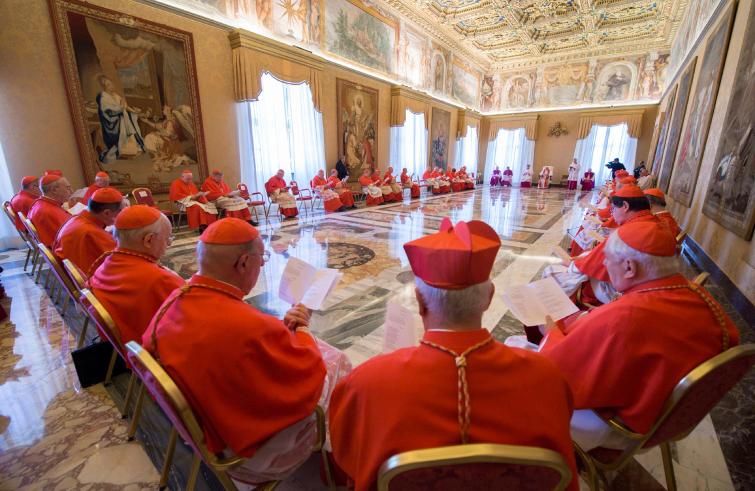
“Let us pray for the new Cardinals, so that, in confirming their adherence to Christ, they may help me in my ministry as Bishop of Rome, for the good of all the holy faithful people of God”: Pope Francis – unexpectedly – announced directly to the faithful, as is now his custom, the creation of 13 new cardinals in the Consistory – the seventh of his Pontificate, planned for November 28, the eve of the first Sunday of Advent.
The names of the 13 new cardinals, announced by Bergoglio at the end of yesterday’s Angelus prayer, include six Italians prelates, three of whom are electors and three non-electors – i.e. not allowed to participate in the conclave because they are over the age of 80. Among them, also a parish priest and a friar non yet created Bishop.
A total of 9 new Cardinals with the right to vote in Conclave, 4 over 80 years of age. After the Consistory of November 28th there will be a total of 232 cardinals, 128 of whom are electors: eight more than the maximum of 120 established by Paul VI, albeit exceeded several times by his successors. After the next Consistory there will be 73 cardinal electors created by Pope Francis, as compared to 39 created by Benedict XVI and 16 by John Paul II. There will be 53 Europeans ( including 22 Italians), 24 Latin Americans, 18 Africans, 16 Asians, 13 North Americans, 4 from Oceania. Cardinal Gualtiero Bassetti, Archbishop of Perugia-Città della Pieve, President of the Italian Bishops’ Conference, welcomed the creation of the new Cardinal-elects: “They are the fruit and gift of our communities”, His Eminence said. “I personally know each one of them – continued the Cardinal – and I am certain that they will live this new responsibility with intensity and humbleness. As the Holy Father reminds us, “the cardinalate is not a promotion, nor an honour, or an award; it is simply a service that entails a broader gaze and a larger heart. To the new Cardinals goes the friendship and affection of the Italian Episcopate, accompanied by remembrance in prayer.”
Six Italian Cardinals. Msgr. Marcello Semeraro, Bishop of Albano, Secretary of the Council of Cardinals appointed by Pope Francis to serve as his advisers for Curia Reform, heads the list of the Italian Cardinal electors. He was recently appointed Prefect of the Congregation for the Causes of Saints by the Holy Father, after Cardinal Becciu resigned from that position and renounced the rights connected to the cardinalate, including the right to participate in the Conclave. Msgr. Paolo Lojudice, Archbishop of Siena-Colle Val d’Elsa-Montalcino, Secretary of the Bishops’ Commission for Migrations of the Italian Episcopal Conference, acknowledged for his dedication to the Roma, will also receive the cardinal’s biretta. Friar Mauro Gambetti, to be elevated to the ranks of cardinal without being bishop, is the guardian of the Sacred Convent of Assisi, the birthplace of the “Poor Man of Assisi”, whom the first Pope in history chose as his namesake is very close to, as evidenced in the decision to sign his third encyclical, Fratelli tutti, on October 4, before the tomb of St. Francis. When he heard he was named to the Cardinalate the Franciscan Father thought it was a “joke.” “I welcome this appointment with gratitude and joy in a spirit of obedience to the Church and service to humanity at this difficult time for us all. I entrust my journey to St. Francis and embrace his words of fraternity. I will share this gift with all the children of God in a spiritual journey of love and compassion towards my fellow other, our brothers and sisters.” Three new Italian cardinals are not electors. They are: Msgr. Silvano Tomasi, titular archbishop of Asolo and Apostolic Nuncio, Father Raniero Cantalamessa, Preacher of the Papal Household – a familiar face also from television – and Msgr. Enrico Feroci, parish priest at Santa Maria del Divino Amore in Castel di Leva, former Director of Caritas in Rome.
The first cardinals-designate from Rwanda and Brunei. Among the new non-Italian cardinals figure Rwanda and the Sultanate of Brunei’s as first-ever cardinals, attesting to the increasingly universal stature conferred on the College of Cardinals by Pope Francis, who chose his confreres coming from the “peripheries” of the world. Cardinals-elect in fact are Msgr. Antoine Kambanda, Archbishop of Kigali, and Msgr. Cornelius Sim, Titular Bishop of Putia in Numidia and Apostolic Vicar of Brunei. The first on the list of cardinals-elect is Msgr. Mario Grech, recently appointed Secretary General of the Synod of Bishops, succeeding Card. Lorenzo Baldisseri who retired. The new cardinal electors include Msgr. Wilton D. Gregory, Archbishop of Washington, named as first African-American cardinal; Msgr. José F. Avincula, Archbishop of Capiz, Philippines, and Msgr. Celestino Aòs Braco, Archbishop of Santiago de Chile. Finally, in addition to the three Italian non-electors, Pope Francis appointed to the College of Cardinals Msgr. Felipe Arizmendi Esquivel, Bishop Emeritus of San Cristobal de Las Casas, Mexico.













